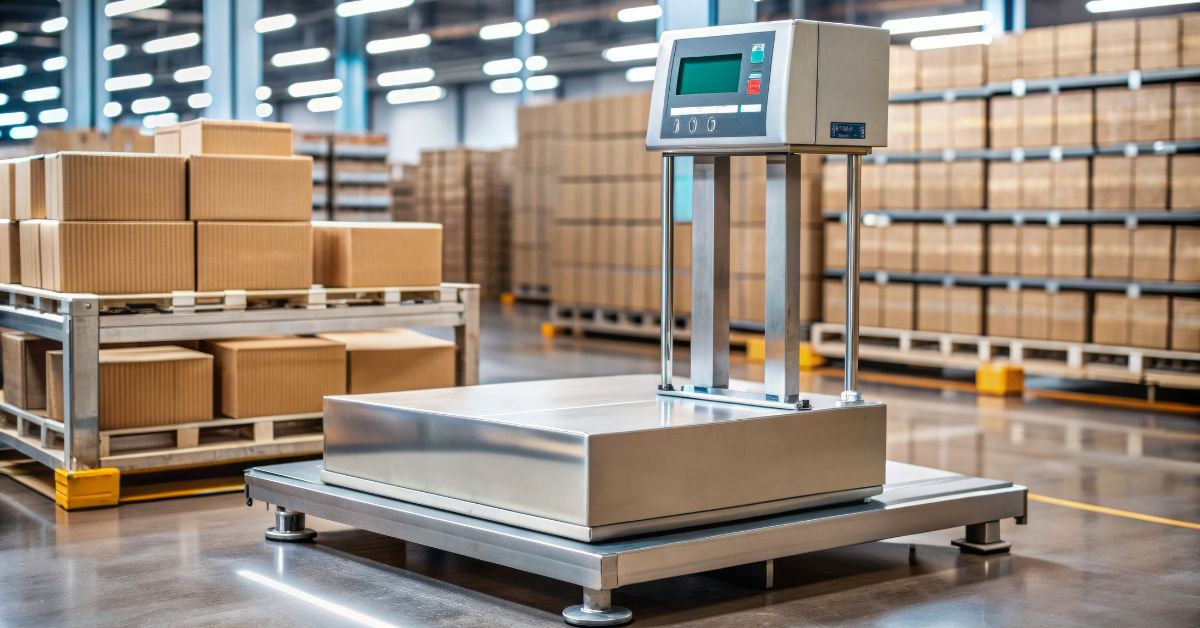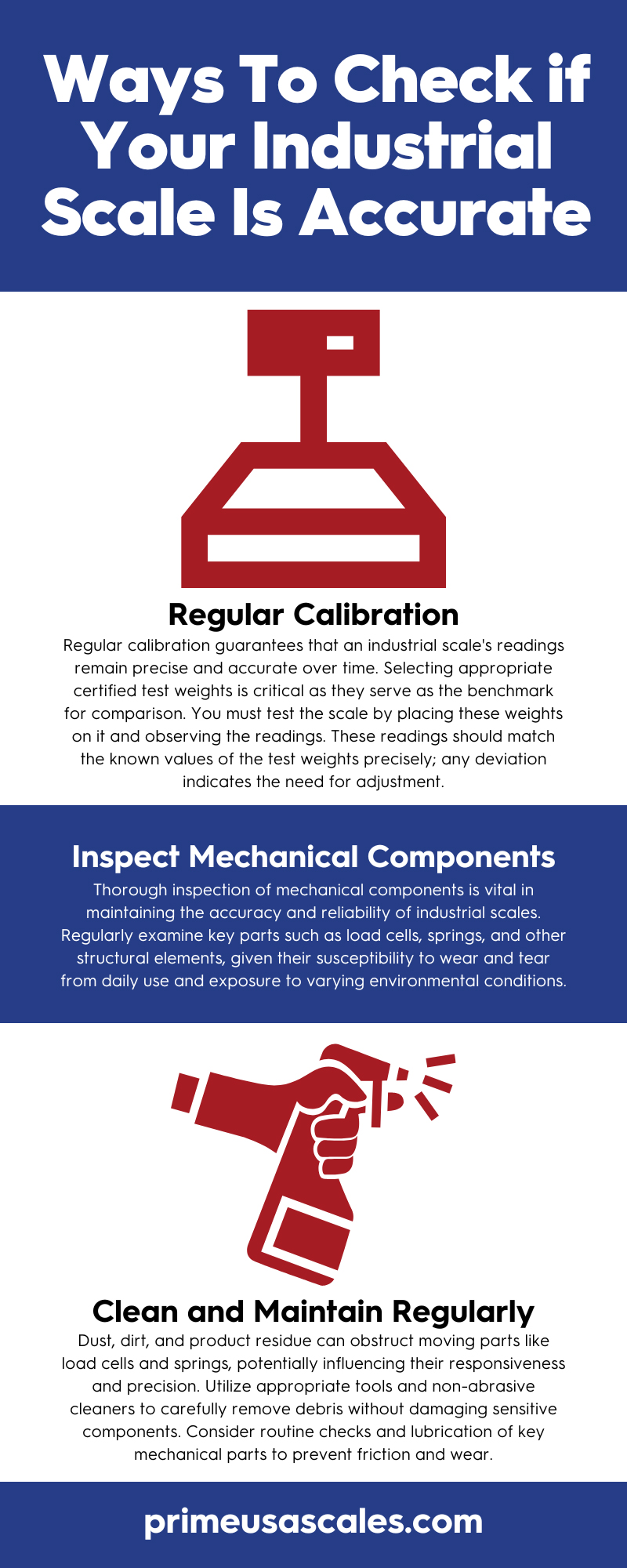Industrial scales are pivotal tools for businesses, especially those involved in manufacturing, logistics, transportation, and quality control. They provide precise measurements critical for operational efficiency, financial accuracy, and regulatory compliance.
However, even the most advanced systems require regular maintenance and checks to ensure continued accuracy. Inaccurate measurements can lead to costly mistakes, supply chain inefficiencies, and even fines for not meeting regulatory standards.
Whether you’re responsible for weighing raw materials, finished products, or shipments, your scales must always function accurately. Environmental conditions, daily wear and tear, and improper handling can lead to errors in weight displays. The following eight ways to check if your industrial scale is accurate will help you maintain precision in your operations and measurement systems.
Understand the Importance of Accurate Weights
Accurate weights are the foundation of diverse industries, influencing critical aspects such as pricing, production efficiency, legal adherence, and overall customer satisfaction. Inaccurate measurements can lead to significant financial discrepancies, affecting product pricing and profit margins, potentially leading to disputes or costly adjustments.
On the production floor, precise weight readings are a major step when it comes to optimal resource utilization and consistency in product quality, directly impacting operational efficiency. From a regulatory standpoint, adherence to weight accuracy is crucial to avoid penalties and follow compliance with governmental standards, which often mandate specific tolerance levels for different sectors.
Regular Calibration
Regular calibration guarantees that an industrial scale’s readings remain precise and accurate over time. Selecting appropriate certified test weights is critical as they serve as the benchmark for comparison. You must test the scale by placing these weights on it and observing the readings. These readings should match the known values of the test weights precisely; any deviation indicates the need for adjustment.
The calibration should account for the scale’s specific environment, considering factors such as temperature, humidity, and even floor vibrations, which can affect its performance. Documenting calibration results is also essential, creating a history to identify trends or recurring issues requiring attention.
Inspect Mechanical Components
Thorough inspection of mechanical components is vital in maintaining the accuracy and reliability of industrial scales. Regularly examine key parts such as load cells, springs, and other structural elements, given their susceptibility to wear and tear from daily use and exposure to varying environmental conditions.
Mechanical components like springs or levers can experience metal fatigue or misalignment, which may lead to inaccurate readings. Regular inspections should include checking for visible damage, such as cracks or bends, and aligning all parts correctly.
Clean and Maintain Regularly
Routine cleaning and maintenance will ensure the lasting accuracy and reliability of industrial scales. Over time, debris and foreign particles can accumulate on and around the scale, infiltrating mechanical components and affecting their performance, which may lead to inaccurate readings.
Dust, dirt, and product residue can obstruct moving parts like load cells and springs, potentially influencing their responsiveness and precision. Utilize appropriate tools and non-abrasive cleaners to carefully remove debris without damaging sensitive components. Consider routine checks and lubrication of key mechanical parts to prevent friction and wear.
Monitor Environmental Conditions
Variables such as temperature, humidity, and vibrations can significantly impact measurement precision. Extreme temperature fluctuations can cause expansion or contraction in scale components, leading to inconsistent readings. High humidity levels can result in moisture buildup, potentially interfering with electronic parts or causing corrosion over time.
To mitigate these effects, place the scale in a stable environment that avoids rapid temperature changes and excessive humidity. Protective enclosures or dedicated scale rooms are highly effective, providing a controlled setting that minimizes external influences.
Check for Software Updates
Many scales today use sophisticated software that controls various functionalities, from measurement algorithms to user interface elements. Quality portable semi-truck scales have sophisticated software systems that enhance their functionality and accuracy. However, like all digital systems, they require regular updates to maintain peak performance.
Software updates often provide critical patches and enhancements that can improve the scale’s overall performance, fix bugs, and enhance security against potential vulnerabilities. These updates might also add new features, refine existing ones, or adjust system protocols to accommodate technological advancements or compliance with new regulations.
Verify Against Another Scale
Cross-verification is essential for ensuring the accuracy and reliability of industrial scales. It involves comparing the scale’s readings with another scale known for its precision. This process can reveal significant discrepancies, indicating calibration errors or other underlying issues.
To perform cross-verification, select a reference scale calibrated and certified for accuracy. Begin by weighing a series of test objects on your scale and recording each measurement. Then, weigh the same objects on the reference scale and compare the results. Any consistent differences may suggest that your scale needs recalibration or further inspection.
Log and Analyze Data
Keeping detailed logs and consistently analyzing data is crucial in monitoring the performance of industrial scales over time. By gathering this data, you establish a history that facilitates the identification of trends, such as gradual drifts or recurring discrepancies, which may require recalibration or additional maintenance.
Leveraging these insights allows for informed decision-making regarding scale upkeep, minimizing the risk of unexpected inaccuracies or operational disruptions. Through regular analysis, businesses can detect early signs of wear and tear or technological obsolescence, enabling timely interventions that keep the scales in optimal working condition.
Engage Professional Services
By partnering with accredited technicians and service providers, you can ensure your industrial scales receive comprehensive evaluations and precise calibrations from experts trained in the latest industry standards and advancements. These professionals possess the unique skills and equipment needed to address intricate issues that might otherwise be overlooked, leading to enhanced accuracy and extended equipment life.
They can conduct detailed inspections, execute precise calibrations, and provide documentation certifying that the scales meet compliance requirements, which are crucial for maintaining operational integrity. Regular service agreements with professionals can offer ongoing support and swift troubleshooting, minimizing downtime and improving the reliability of measurement operations.
Regular and thorough checks of your industrial scale’s accuracy protect your business from potential errors and inefficiencies. Implementing these strategies to check if your industrial scale is accurate will enhance its overall performance and lifespan. By routinely checking factors such as calibration, environmental conditions, and mechanical integrity, you can maintain the trust and reliability that precise measurements provide to your operations.
Call us today to learn more about scale accuracy and to explore a wide range of quality industrial scales that cater to your specific business needs. Our team is ready to assist you with any questions and provide solutions that guarantee precision and reliability in your operations.

